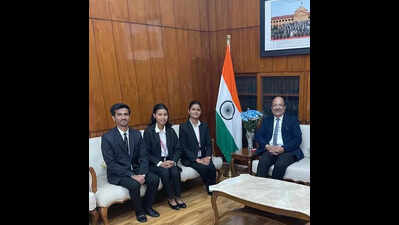Prayagraj: Under its new interactive series titled "Beyond the Judgments," aimed at providing students with a deeper understanding of the law, lives, experiences and values of judicial luminaries, three students of Dr Rajendra Prasad National Law University (RPNLU), Prayagraj, interacted with the Chief Justice of the
Allahabad High Court, Justice Arun Bhansali.In the inaugural episode, a team comprising Stuti Mishra, Sujal Sonker and Khushi Shandilya, interacted with Justice Bhansali. The conversation offered rich insights into his professional journey, personal values and views on pressing issues in the legal system.Justice Bhansali, a third-generation lawyer, began by reflecting on his entry into the legal profession in 1989, noting that it was not a chance decision but a conscious one.Sharing his experience of working in both Rajasthan and Allahabad High Courts, he explained the difference between serving as a judge and taking up the administrative responsibilities of a chief justice. "As a judge, your only responsibility is to deliver justice, but as a chief justice, you must also manage the administrative machinery of the entire High Court and district judiciary," he said. Interestingly, he also pointed out that Rajasthan and Allahabad High Courts share a historical connection, as the first three chief justices of Rajasthan were from Allahabad.Addressing the ever-relevant tension between legal principles and public opinion, Justice Bhansali firmly asserted that judges must adhere to
legal doctrines.
He stressed the importance of neutrality and legal objectivity in judicial decision-making. In situations where personal beliefs may conflict with the application of law, he opined that the most appropriate course of action for a judge is to recuse from the matter.When asked to recount a particularly complex or impactful case from his judicial career, Justice Bhansali shared a moving anecdote involving a physically challenged woman whose candidature was initially rejected by the recruitment board.
Even though both parties in court—petitioner and respondent—were inclined towards rejecting the petition, Justice Bhansali carefully examined the legal provisions and ultimately delivered a judgment in favour of the girl, reinforcing the judiciary's role as the protector of marginalised voices.Justice Bhansali also opened a personal window into his life and shared his passion for philately and gardening. He said he developed a unique interest in taking autographs of the person in whose honour the stamp is issued or from their family members. He shared his old days' enthusiasm when he took autographs from dignitaries, including Mother Teresa on a first-day cover, Prince Charles on the stamp of Lord Mountbatten, and the Dalai Lama on his stamp cover, to name a few. That is how the signatures made those stamps unique and rare.Discussing long-term reforms, he advocated for
faster delivery of justice, increasing the number of judges, and strengthening the legal capabilities of young lawyers. He also expressed concern about the misuse of the idea of "transparency," which sometimes becomes a means to exert undue pressure. Certain matters, he emphasized, must remain within the boundaries of confidentiality.Justice Bhansali then shared his views on gender equality in the legal profession. On encouraging women in law, he acknowledged the difficulties women face in sustaining their careers and suggested building strong professional partnerships early as a solution."There is no substitute for hard work and patience. Many brilliant people lose their way due to impatience. Whether in profession, friendship, or family life—patience helps avoid conflict and leads to success," said Bhansali, who is also the chancellor of RPNLU.











